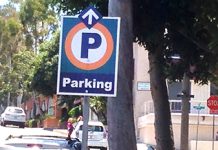
With an uncommon dissenting vote, the Laguna Beach Unified School District voted 4-1 Tuesday to change how math is taught. The change will eliminate geometry in the eighth grade.
New board member Dee Perry voted against the changes, which will commence next fall. She supported a strong contingent of parents with gifted math children who opposed the change. “I’m sorry for not including the parents more,” she said when the vote was taken at the end of a nearly three-hour discussion.
The change in the sequence of math classes and some of the class names aligns with the newly mandated Common Core State Standards. No advanced math classes will be offered in middle school; all accelerated classes will now be offered at the high school, as approved by the board.
Geometry will now be offered in ninth grade; some name changes include Introductory and intermediate algebra instead of algebra 1 and 2. District administrators, teachers and consultants spent the last two years working on the changes, according to the district’s report.
Parents argued that students with a proclivity for math are not being challenged now and with the new math changes will become even more bored. If accelerated math classes are offered only in high school, these students will be limited in how far they can advance before applying for college, they stated.
David Flores and his wife Gunn Marie Hansen, both public education administrators, said they’ve purchased an expensive online math tutorial program from Stanford University to keep their fifth-grade son interested. Flores and Hansen organized the parents opposing the changes, who were also surprised to learn of a third math course sequence, known as a pathway, presented for the first time at Tuesday’s meeting.
The pathway was added, according to board member Jan Vickers, to address parents’ request for an accelerated option at the board’s Feb. 10 meeting. The advanced pathway starts with Common Core Math 7 for sixth-graders, introductory algebra for seventh-graders and intermediate algebra and statistics for eighth-graders. High school math classes will accelerate in 10th and 11th grades after geometry is taken in either ninth or 10th grades. The changes are being made to meet entrance requirements from the California university and state college system, administrators said.
Both sides found examples to support their position at other Orange County school districts. Opponents of the approved changes showed that out of a selected nine other districts, five were offering geometry in eighth grade. School administrators showed that three of its surveyed districts will offer geometry in the eighth grade.
Other parents of gifted math students wondered why changes were being considered at all. “Is this a solution looking for a problem?” asked Amy Hundhausen, an electrical engineer with Broadcom Corp.
“We rely on experts to make a change for the better,” said board member Bill Landsiedel. “Why would they do anything different than that?”
If changes are needed to improve the program as the classes are implemented, they will be made, said board president Ketta Brown. “This has been a very strategic process,” she said. “We have to take a first step. It’s not going to hell in a hand-basket with a course name change.”
Carrie Reynolds, a parent of an eighth-grader, said she represented parents who didn’t object to the changes. “I trust our administrators,” she said at the meeting.
A UC Irvine professor of developmental and cell biology, Arthur Lander, said Laguna Beach High School is not known for its academic prowess. “Frankly, accelerating just another year and just another year is not the right thing to do,” said Lander, who has a daughter in sixth grade at Thurston Middle School who’s not being “appropriately challenged.” He said the brain is more receptive to absorbing math in the early years. “We can’t just wait for high school.”
Linder said enriching the learning experience by applying the concepts to real-life solutions will advance students in their skills and abilities. More emphasis on honors classes is needed for the 10 to 20 percent of advanced math students who are now bored, he said, not less.
“You’re going to be abandoning them and we don’t want to abandon them,” he said. “These are the ones who are going to go out and make great scientific discoveries and become civic leaders. They’re a minority and an important minority,” he said. He said Common Core is geared for students who do not excel at math.
UCI education professor Elizabeth Van Es said colleges and universities aren’t looking for advanced placement classes on a student’s application, they’re looking at the student’s all-around activities. “They’re looking at the whole package,” she said. “It’s about a human being. It’s not about a test score.” Students seeking admission to the UC and Cal State systems are required to have taken four years of high school math.
High school math teacher Steven Bogusiewicz said his colleagues agree that that the new algebra will be more challenging in terms of problem-solving than the old standard.
He said students continue to ask the age-old question, “When am I ever going to use this?” about complicated math theories. With the Common Core emphasis on collaboration, deeper understanding of narrower subjects and real-life application, he said he soon expects to hear, “I’m going to use this when….” He said the changes are based on a well-thought-out plan.





[…] teachers have more time with individual students to convey new state-mandated standards known as Common Core, said Winston. Common Core focuses on technology, text writing and testing, according to […]